| Reviews & Columns |
|
Reviews DVD TV on DVD Blu-ray 4K UHD International DVDs In Theaters Reviews by Studio Video Games Features Collector Series DVDs Easter Egg Database Interviews DVD Talk Radio Feature Articles Columns Anime Talk DVD Savant Horror DVDs The M.O.D. Squad Art House HD Talk Silent DVD
|
DVD Talk Forum |
|
|
| Resources |
|
DVD Price Search Customer Service #'s RCE Info Links |
|
Columns
|
|
|
Poldark: Series 2
"Surely what you fear is what everyone has had to face since the world began. But it's certain. You can't fear a certainty. Tomorrow doesn't exist. There can only ever be now. We cannot ask for more. There is no more to ask."
More melodrama. More action. More thwarted love. Acorn Media has released Poldark: Series 2, the 1977 continuation of the wildly popular 1975 Poldark miniseries, with stars Robin Ellis, Angharad Rees, and Ralph Bates returning as our dashing hero, strong, willful heroine and dastardly villain, in that order. Zero extras this time around, which seems a shame when you learn how popular these adaptations were, but the non-stop action, back-stabbing double-crosses, and melodramatic amorous adventures, stretched out over an epic-sized canvas, should prove irresistible to lovers of historical romantic fiction and vintage British television.
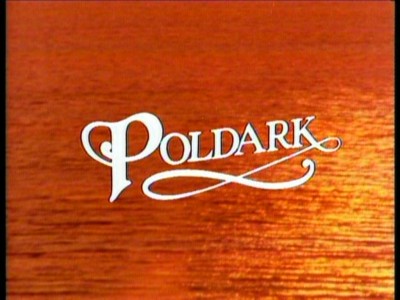
It's impossible to properly encapsulate the sprawling events of the 11+ hour Poldark: Series 2 here in this review, nor would I dare throw out too many spoilers...at least until I put up my usual red "Spoilers Warning!" flag. So I'll just try and set the stage as briefly as I can. Having been mustered out of the army for malaria he picked up in the States, late 18th century aristocrat Ross Poldark (Robin Ellis) returns to his beloved Cornwall, England, greeting his gypsy hellcat wife, Demelza Poldark (Angharad Rees), and wondering when he'll meet his nemesis: grasping, power-hungry businessman and politician, George Warleggan (Ralph Bates). Far from honoring Ross with friendship and loyalty after Ross saved George and his wife, Elizabeth (Jill Townshend), from a murderous mob at the end of Series 1, jealous, class-conscious George's hatred for Ross burns even brighter--particularly since he has to share his house (which used to belong to Poldark) with aged Aunt Agatha Poldark (Eileen Way), a wily, smart-mouthed old hag who loves nothing more than putting the pompous, vicious George in his place.
Determined to destroy his rival Ross once and for all, George engineers various attacks upon the extended Poldark family--from banking plots, to political maneuvers, to outright violence--in the hopes of assuaging his own jealousies over Ross' and Elizabeth's past love affair...and his suspicions concerning the parentage of his son, Valentine. But he finds he has little popular support from the villagers over aristocratic man-of-action Ross, who wipes out past misdeeds with an adventure over in France, where he steals back friend Dr. Dwight Enys (Michael Cadman) from the clutches of the murderous "democratic" revolutionaries. Ross does himself no favors, however, when he also rescues Hugh Armitage (Brian Stirner), a handsome young officer who takes an immediately liking to Demelza...who maddeningly returns this forbidden affection. Expressly forbidden--and entirely unwelcome--affection comes from grotesque Reverend Osborne Whitworth (Christopher Biggins) towards his new wife, Morwenna Chynoweth (Jane Wymark), Elizabeth's cousin who plays nursemaid to Elizabeth's son Geoffrey Charles. Bartered off to the Reverend by unfeeling, manipulative George, pretty Morwenna still loves honest, good-hearted blacksmith Drake Carne (Kevin McNally), Demelza's brother, but he's not of her class, and thus, unsuitable for marriage. Instead, the fat, ill-tempered Osborne corrupts the young Morwenna, almost killing her during her pregnancy, only to take up with her sluttish, venal little sister, Rowella (Julie Dawn Cole). Who will wind up with whom at the end of Poldark: Series 2, and more importantly: will they be happy?
SPOILERS WARNING!
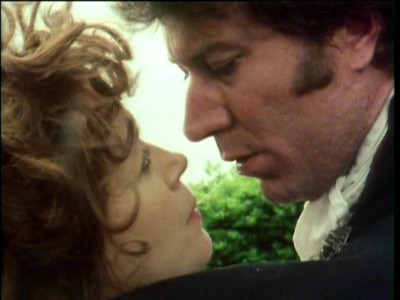
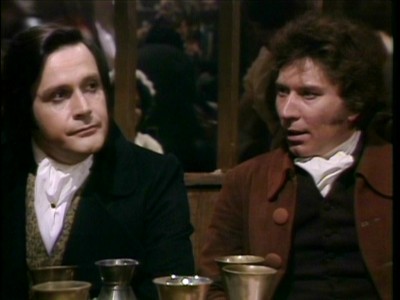
I won't go into any background on the author of the original Poldark novels, Winston Graham, or discuss the first series, since I wrote about them both back in March (you can access that review here). Taking this continuation on its own merits (newcomers admittedly will have some difficulty picking up references to previous relationships, feuds, wrongs, and slights here if they haven't seen the first mini), Poldark: Series 2 puts on speed, ramping up the swashbuckling aspects of the first series (we even get an old-fashioned duel), while sticking closely to fairly familiar melodramatic conventions. In my review of the first series, I wondered how "faithful" the mini was to the original source novels (where I also wondered if some of Graham's more serious considerations and themes were given less emphasis in favor of a more conventional approach). Comparing this second outing to the first, it seems clear that "serious" considerations have been put entirely on the back burner, while splashy derring-do and heavy-breathing romantic entanglements dominate...and that's just fine with me.
That assessment isn't meant to diminish Poldark: Series 2 in any way; "entertaining" is just as hard to achieve artfully as "serious drama," and Poldark: Series 2 is, if nothing else, entertaining. Playing off the inherent appeal of serial drama, where the viewer just has to keep coming back to see how the story ends, Poldark: Series 2 keeps the cliffhangers coming, juggling multiple storylines with, if not finesse, then at least crude energy--and that's going to be enough to satisfy fans of this type of historical fiction. Taking place during the tumultuous upheaval wrought by Napoleon's rise to power, Poldark: Series 2 only mentions the little general once or twice, while paying lip service to other political and sociological themes that merely serve as convenient hangers for plot machinations. Ross Poldark may indeed sympathize with the starving miners who riot for food (and thereby creating the possibility of an interesting contrast for an aristocrat in both breeding and wealth), but Poldark: Series 2 doesn't show that riot--we only hear about it, and it's only brought up to illustrate yet another maneuver by George and Ross to get the better of each other. Politics and the notion of class struggle in this mini are sparingly used only to set up the next screw-job by the perpetually warring leads.
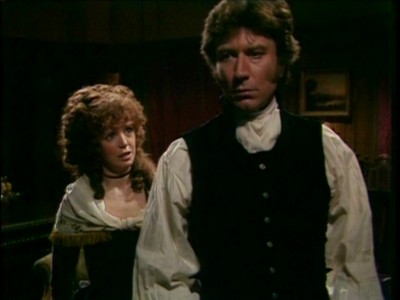
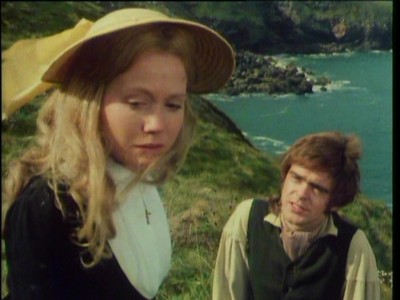
No, love and action and twisty plot developments for their own sake rule in Poldark: Series 2, all of them thoroughly familiar, and all of them can't-miss precisely because of that time-tested conventionality. Although the evolution of Ross' and Demelza's tempestuous marriage is ostensibly the centerpiece in the film, villains always steal the show in melodrama, and that's true here, as well. Curiously, the handling of Ross' almost-convinced knowledge of his siring Valentine is as awkwardly dealt with as Demelza's romance with Armitage is brought over flat and uninspiring. Not having read the original books (I've read other Graham novels, and he wasn't that sloppy), I can't tell how much of this has been either bobbed from the original, or invented for the film. However, I can tell when a subplot is uninteresting and certainly, such is the case with Ross and Elizabeth's deteriorating relationship (it should be one of the mini's most compelling). Equally surprising is the somewhat stale take on Demelza's love affair with Armitage, which plays all soft and puppylove-ish, when it should be erotic and sensual and powerful, since she's almost breaking away from Ross, the love of her life. According to what I've researched on the web about Poldark and Graham, he wasn't too happy with the first filmed adaptation, and spurned involvement with this second one, thereby necessitating the cancelling of the series (there was a prospective series pilot shot in '96, with all new actors, which created a firestorm of ill-will from viewers who only wanted Ellis and Rees in the lead roles). Considering that strong reaction from an author who might have been grateful for the promotional possibilities of his novels' continued presence on television, I'm betting the problems in construction and tone I'm sensing with these scenes probably weren't present in the novels.
Luckily, our two villains--George Warleggan and the Reverend Osborne Whitworth--deliciously fulfill our melodramatic expectations, with evilness and perversity to spare. The filmmakers are particularly adept at letting the cold, selfish George dominate the proceedings, unleashing his murderous desire to consolidate power that switches from indifference to almost-mad passion in the blink of an eye (Robin Ellis may be the mini's heartthrob, but Ralph Bates walks away with the acting honors here). Bates' character lacks any redeeming features (one of the highlights is his shaking to death a 98-year-old woman), but he's the anchor for the rest of the film, providing much-needed jolts of adrenalin every few scenes as he continually schemes--and fails--to bring down all those around him, including his "loved" ones. Biggins' Reverend Osborne is an even cruder, more base villain, upping Poldark: Series 2's squirm factor considerably as he selfishly sets out to abuse his wife. Having already killed his first wife by having sex with her too soon after she gave birth (his considerable girth caused internal injuries), sexually-insatiable Osborne almost does the same thing to sweet Morwenna (Midsomer Murders' Jane Wymark is perfect here: at first innocent, and then convincingly scarred), before he settles on her sluttish sister Rowella to relieve his lust. Only hinting at some unspoken sexual "fantasy" Rowella will provide Osborne should he continue to pay her (by all means, send me emails if you think you guessed it...), the filmmakers bring a surprisingly kinky tone to this historical romantic framework, once again illustrating how much further English television was willing to go in comparison to the positively Puritanical American TV of 1977. Taken within that context, you can certainly give credit to popular miniseries like Poldark: Series 2 and other British imports to PBS series like Masterpiece Theater, for helping to "open up" American network dramatic television to more adult themes and depictions (for better or worse, as you may judge it).
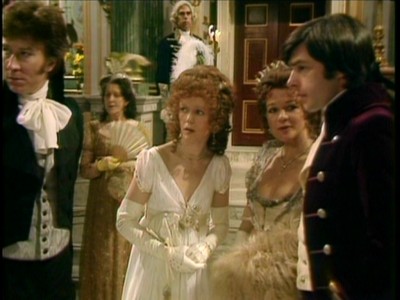
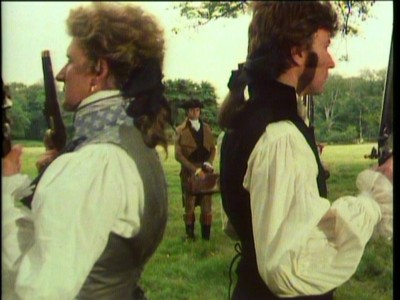
Here are the 13 episodes of the 4-disc set, Poldark: Series 2, as described on the discs' slimcases:
DISC ONE
Part 1
George Warleggan now owns the home of Ross' elderly aunt Agatha. Ross protests to no avail, but George--whose wife, Elizabeth, is pregnant--cannot easily dismiss the ominous words Agatha utters about a "child born under a black moon."
Part 2
Demelza Poldark is expecting a child of her own, but Ross is preoccupied with other news--the wreck of Dwight Enys' ship off the coast of France. Meanwhile, Demelza's two younger brothers, Sam and Drake Carne, generate more friction between the Poldarks and the Warleggans.
Part 3
After narrowly escaping execution in France as a spy, Ross continues the search for his friend Dwight. Drake also runs risks as he pursues a relationship with Elizabeth Warleggan's young cousin, Morwenna.
Part 4
George Warleggan makes his own plans for Morwenna's future--and plans of a distinctly different sort for Drake. Only Ross' intervention saves his young brother-in-law's neck, an act of generosity that Drake is determined to repay.
DISC TWO
Part 5
A daring raid to rescue Dwight from a French jail succeeds--but at great cost. Back in Cornwall, tension fills the Warleggan household after their infant son falls ill; Morwenna is unhappily married off to a vicar; and Aunt Agatha's final words shock George to the core.
Part 6
George sets out to find the truth about his son. Dwight marries his sweetheart, Caroline. And Morwenna's recently arrived younger sister, Rowella, attracts the attentions of Morwenna's husband, Ossie.
Part 7
Ossie and Rowell form a new bond as Ross and Elizabeth rediscover an old one. More interested in social status than romance, George concentrates his efforts on getting elected as the local member of Parliament.
DISC THREE
Part 8
Members of the Warleggan and Poldark families become mired in jealousy. George takes out his hatred of the Poldarks on poor Drake Carne, but it is the gentle Morwenna who proves particularly ruthless in exacting retribution and getting just what she wants.
Part 9
Corn prices are rising, miners are rioting, and Ross is divided between his loyalties to the Crown and sympathies for the poor. When a new election is called, he decides to run for Parliament against George, who risks not only losing his seat, but also his wife.
Part 10
Marital tension pervades the Poldark home, although it's nothing compared to the rancor between Morwenna and Ossie. Tragedy lurks for Dwight and Caroline, while George finds yet another way to hit back at Ross.
DISC FOUR
Part 11
A party at the Warleggans' attracts the great and the good--as well as the uninvited Ross, who manages to steal some moments with Elizabeth alone. Meanwhile Drake faces an excruciating choice when he learns about the fate of Morwenna's husband, Ossie.
Part 12
Drake disappears, suspected of murder, and George's plans to hurt Ross begin to take effect. But it is the actions of Demelza that not only nearly bankrupt the Poldarks, but also put Ross' life on the line.
Part 13
Ross accepts a duel, risking a conviction for murder. Newly pregnant Elizabeth considers extreme measures to safeguard her marriage and family. And Drake makes one last play for a life of happiness with Morwenna.
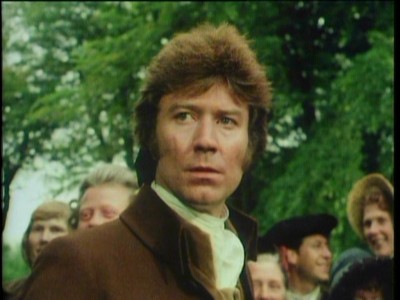
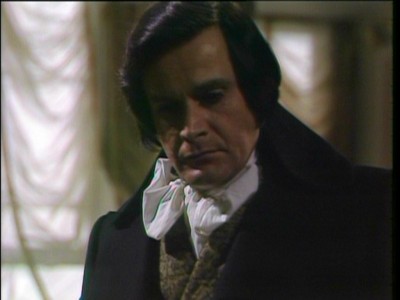
The DVD:
The Video:
Exactly the same as the first series' release. If you're used to these kinds of transfers from British TV series and shows from the 70s, you won't mind the look of this full-screen, 1.33:1 transfer. I would imagine the elements used for this transfer came from a video dupe; if not, the original masters are fading fast, with blown-out contrast and dull-as-dishwater colors (part of that might also be the inferior production values of British television at that time, with crappy video-shot interiors and fuzzy 16mm fidelity for the location work, compromising the overall look of the movie). No compression issues to speak of, though.
The Audio:
The Dolby Digital English 2.0 stereo audio track certainly doesn't take advantage of any split directionality. Recording levels fluctuate (that could very well be from the original source materials), and hiss is noticeable on a high-end system. English subtitles are available.
The Extras:
Not even any text extras, as in the first series. Nothing.
Final Thoughts:
Politics and sociology, scattershot as they were in the first series, are pushed aside here in Poldark: Series 2, as the filmmakers focus on love and adultery, backstabbing revenge, and swashbuckling heroics. Even at 11+ hours, Poldark: Series 2 moves along at a hell of a clip, and there are enough interesting moments with our repugnant villains to distract us from the less-successful romantic entanglements of our sometimes bland heroes. Melodrama to be sure, and welcome for that. I highly recommend Poldark: Series 2, but only for those who saw the first series.
Paul Mavis is an internationally published film and television historian, a member of the Online Film Critics Society, and the author of The Espionage Filmography.


|
| Popular Reviews |
| Sponsored Links |
|
|
| Sponsored Links |
|
|
| Release List | Reviews | Shop | Newsletter | Forum | DVD Giveaways | Blu-Ray | Advertise |
|
Copyright 2024 DVDTalk.com All Rights Reserved. Legal Info, Privacy Policy, Terms of Use,
Manage Preferences,
Your Privacy Choices | |||||||













